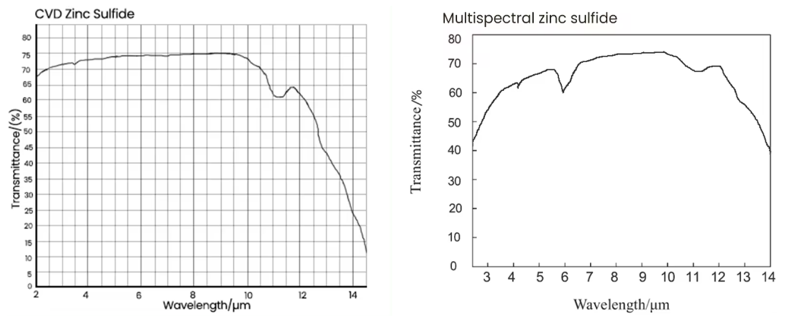Zinc Sulfide (ZnS)Window
Zinc sulfide (ZnS) is a broad-band (3.72 eV) group II-VI semiconductor material with high optical transmittance in the near-infrared (1-3 μm), mid-infrared (3-5 μm), far-infrared (8-12 μm) and other spectral bands, with moderate mechanical properties, thermal properties and chemical stability, and is an important class of optoelectronic functional materials. The multi-spectral band transmittance ZnS materials are widely used in infrared optics and other fields.
Zinc sulfide (ZnS) window is one of the basic optical components in optics, usually used as a protective window for electronic sensors or detectors of the external environment. It is used to separate the two sides of the environment, such as separating the inside of the instrument from the outside, so that the inside and outside of the instrument are isolated from each other, thus protecting the internal devices. And it’s often widely used in optical systems, such as projectors, liDAR, optical sensors and other devices.
Our company can provide round ,square and rectangular Zinc sulfide (ZnS)Meniscus lens with diameters from 2-300mm.and thicknesses from 0.12-60mm (accuracy up to 20-10, 1/10L@633nm),coating AR, BBAR, AF or upon request.
Technical parameters of Zns Window
Diameter | 2-300mm |
Thicknesses | 0.12-60mm |
Dimension tolerance | +/-0.05mm |
Thickness tolerance | ±0.05mm |
Surface quality (scratch & dig) | 60-40, 40-20, or better |
Surface accuracy | λ/2, λ/4 or better |
Parallelism | 3' ,30'' |
Bevel | 0.1~0.3mm x 45 degree |
Clear aperture | >85%,>90% |
Coating | AR coating or cutom |
Material properties of Zns
| Physical Properties | CVD Zns | Multispectral CVD Zns |
| Density[g/cm3] | 4.09 | 4.09 |
| Resistivity[Ω.cm] | ~1012 | ~101.3 |
| Melting Point [℃] | 1827 | |
| Chemical purity[%] | 99.9996 | 99.9996 |
| Thermal Expansion [1/K] | 6.6*10-6@273k | 6.3*10-6@273k |
| 7.3*10-6@373k | 7.0*10-6@373k | |
| ThermalConductivity [J/k.m.s] | 16.7@298k | 27.2@298k |
| Specific Heat Capacity [J/g.K] | 0.469@298k | 0.515@298k |
| Knoop Hardness [kg/mm2] | 200-235 | 160 |
| Bending strength [Mpa] | 103 | |
| Young's Modulus [GPa] | 74.5 | 74.5 |
| Poisson's coefficient | 0.29 | 0.29 |
| Optical Properties | CVD Zns | Multispectral CVD Zns |
| ransmission Range | 1-14μm | 0.37-14μm |
| Refractive index inhomogeneity[△n/n] | <7.3*10-4@10.6μm | <0.2*10-4@632.8nm |
| Absorption coefficient | 0.2@10.6μm | 0.2@10.6μm |
| [1/cm] | ||
| Thermal light coefficient | 4.6*10-5@1150nm | 5.43*10-5@632.8nm |
| [1/k,298-358k] | 4.3*10-5@3390nm | 4.21*10-5@1150nm |
| 4.1*10-5@10.6μm | 3.87*10-5@3390nm |
Transmission curve
The transmission curve of standard CVD zinc sulfide, at (20±3)℃ temperature, is shown in the figure. The transmission in the spectral range from 8μm to 10μm should not be less than 70%; The transmission curve in the spectral range from 3μm to 10μm should not have other absorption peaks except for the absorption peak near 6μm.
The transmission curves of the multispectral CVD zinc sulfide at (20±3)℃ are shown in Fig. The transmittance at 1064 nm is not less than 70%, and the transmittance in the spectral range from 3 μm to 5 μm is not less than69%, and the transmittance curve is smooth without absorption peak; The transmittance in the spectral range from 8 μm to 10 μm is not less than 70%.
